

Format & Generate Citations – APA, MLA, & Chicago. AASL LearningStandards. Technology Survey for 4th-5th Grades. COPYRIGHT AND FAIR USE. Literature Map - The Tourist Map of Literature. Format & Generate Citations – APA, MLA, & Chicago. How to Blog Legally. One of the many wonderful things about blogging is that you don’t need any previous experience or education to do it.
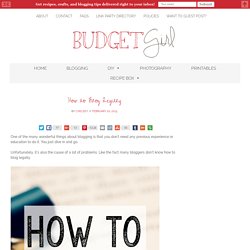
You just dive in and go. Unfortunately, it’s also the cause of a lot of problems. Like the fact many bloggers don’t know how to blog legally. Remember when I wrote about how I monetized my blog and I said that blogging is more than just telling stories and taking pretty pictures? This is what I was talking about. Understanding the laws that affect your blog is one of the more complicated parts of blogging.
I’ve been in and out of a lot of blogging help groups and the one thing I notice is that many bloggers don’t know to Google things about blogging legally (or don’t know to Google at all). Here’s the thing: none of us starts off knowing everything. Because I see a lot of bloggers doing things that could get them into some legal trouble, let’s talk about how to blog legally. This post applies to bloggers within the US. 1. Ever work with a brand? Their arguments are weak.
Classroom Posters and Resources for Teaching Students about Digital Citizenship. August 13, 2014 After posting about the iPad apps you should try in the first week of this new school year and after learning about the 26 questions students should be able to answer during this week, now comes the turn to talk to your students about digital citizenship, a concept of high importance for students overall development as good citizens.
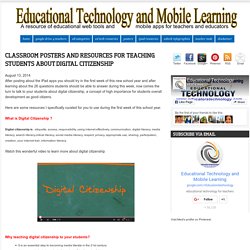
Here are some resources I specifically curated for you to use during the first week of this school year. What is Digital Citizenship ? Digital citizenship is : etiquette, access, responsibility, using internet effectively, communication, digital literacy, media literacy, search literacy,critical literacy, social media literacy, respect, privacy, appropriate use, sharing, participation, creation, your internet trail, information literacy.
Research tools. 8 Web Browser Shortcuts You Should Be Using. OKR. Voice of Literacy. Using a Modeling Language for Supporting University Students' Orienting Activity when Studying Research Methods. The teaching of research methods in higher education has been criticized for the insufficient connection to students’ own research problems (Benson & Blackman 2003; Edwards & Thatcher 2004), and often research methods are not integrated in the overall research process.
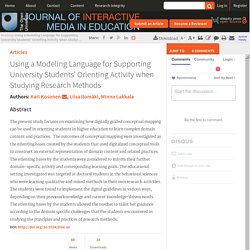
In addition, the complexity of research methods highlights difficulties in their understanding. University teachers in the field of social and behavioural sciences are nowadays challenged to train “research experts” who are able to incorporate both qualitative and quantitative methods and approaches in their research projects (Tashakkori & Teddlie 2003). This highlights the need of training in qualitative research methods for psychologists and other practitioners (e.g., in the UK, see Forrester & Koutsopoulou 2008). There is also a growing interest in the efficient ways of teaching these methods in higher education (Hansen & Rapley 2008; Navarro 2005). Theoretical Background The aims of the study Method Participants.
Journal of Information Literacy. 5 Tools to Help Students Learn How to Learn. Carol Kuhlthau. In the first stage, initiation, a person becomes aware of a gap in knowledge or a lack of understanding, where feelings of uncertainty and apprehension are common.
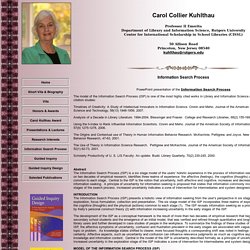
At this point,the task is merely to recognize a need for information. Thoughts center on contemplating the problem, comprehending the task, and relating the problem to prior experience and personal knowledge. Actions frequently involve discussing possible avenues of approach or topics to pursue. In the second stage, selection, the task is to identify and select the general topic to be investigated and the approach to be pursued. Feelings of uncertainty often give way to optimism after the selection as been made and there is a readiness to begin the search. The third stage is Exploration characterized by feelings of confusion, uncertainty, and doubt which frequently increase during this time. The ISP presents information seeking as a process of construction influenced by George Kelly’s personal construct theory (2). 2. 3. 4.
Less proficient IL skills. College & Research Libraries. Big6 information literacy. The Big6 research model. FINDS Research Model. TRAILS: Tool for Real-time Assessment of Information Literacy Skills. Information literacy standards for teachers. Critical thinking skills. Medline searching. Writing process. Library Instruction Round Table (LIRT) Characteristics of Programs of Information Literacy that Illustrate Best Practices: A Guideline.
Approved by the ACRL Board, June 2003, revised January 2012.
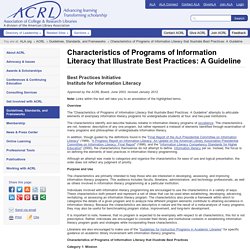
Note: Links within the text will take you to an annotation of the highlighted terms. Overview. Association of College & Research Libraries. Communications in Information Literacy. Abstracting. Search sites. Teacher Librarian. See You in San Francisco Teacher Librarian Magazine will be at booth #204 in the Exhibit Hall at the American Library Association Annual Conference in San Francisco!
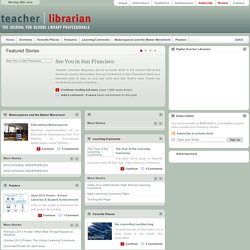
Mark your planners now to stop by and say hello and see what’s new! Check our conference specials, including... Continue reading full story (read 1,688 views times) The Year of the Learning Commons. School Library Research (SLR) Archive. Information Literacy Florida's Library Media Curriculum Connections. FINDS Research Model Florida Association for Media in Education (FAME)